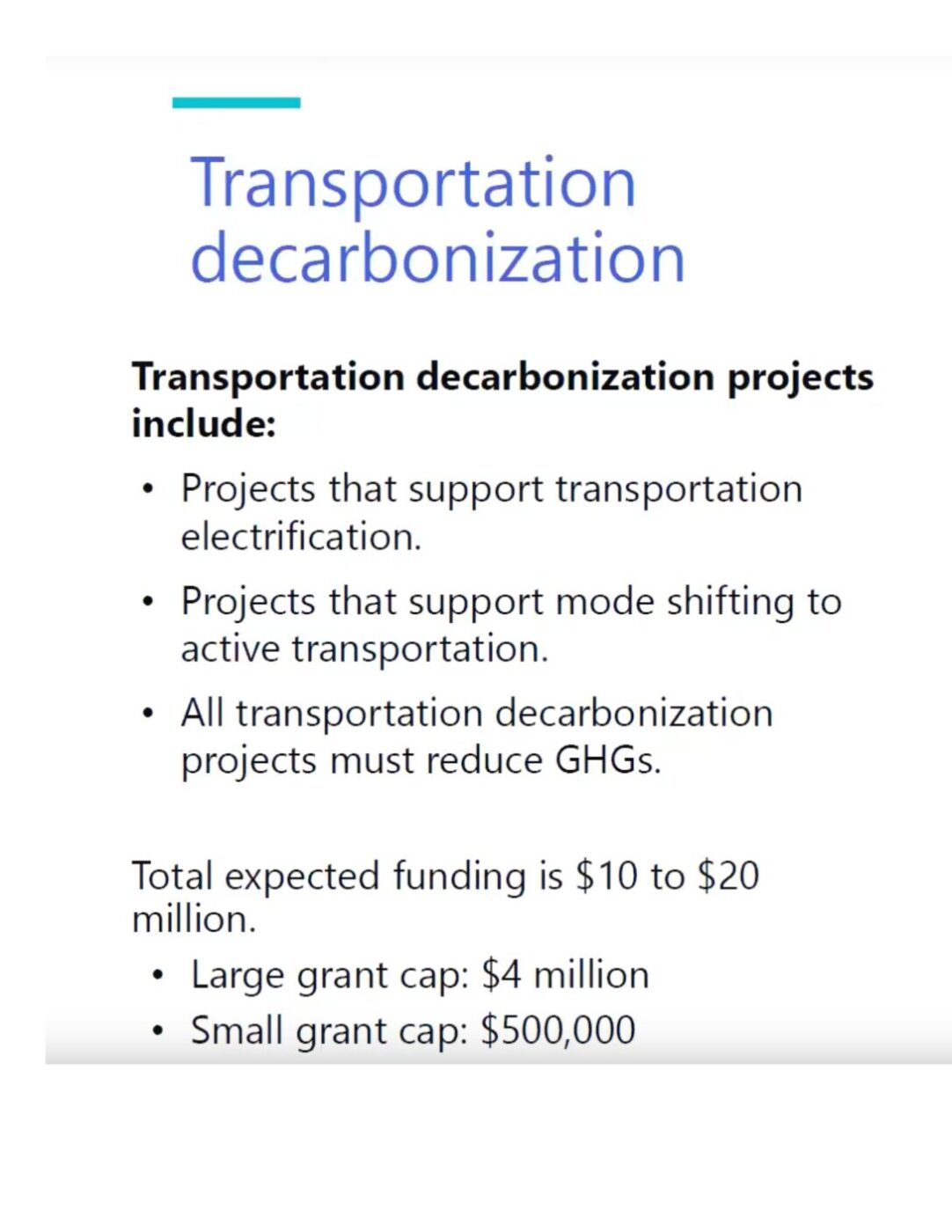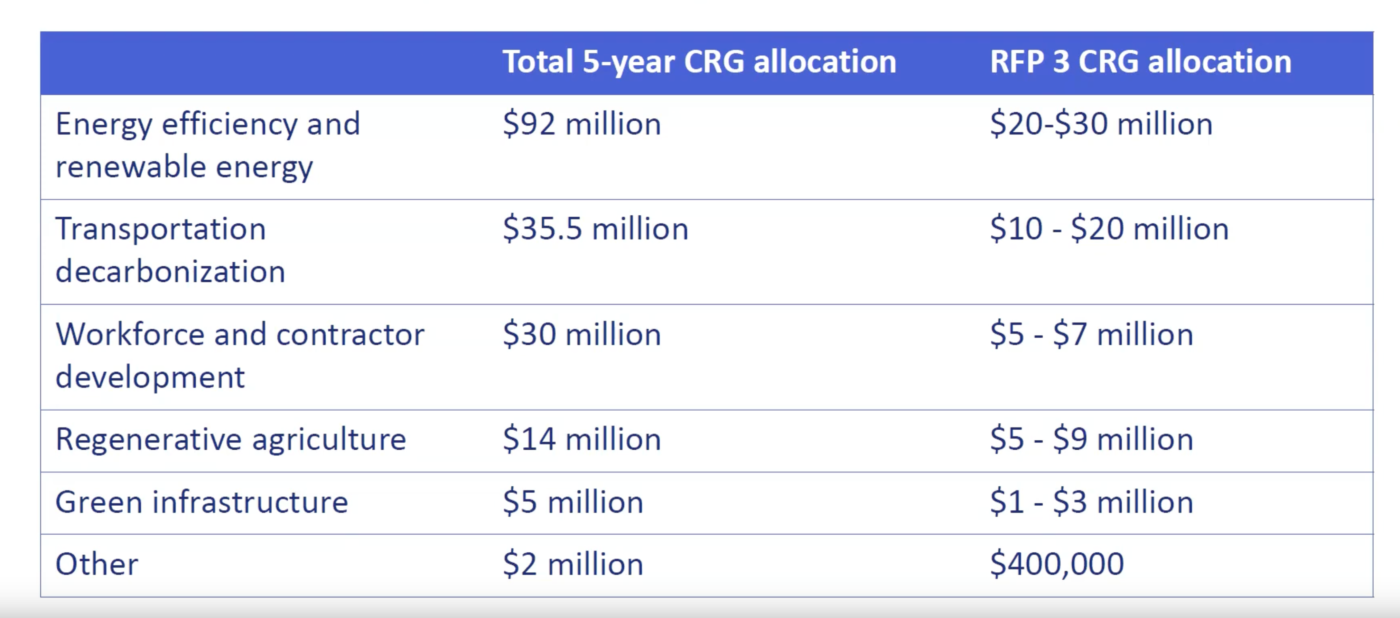The Portland Clean Energy Fund (PCEF) announced the third round of its Community Responsive Grants (CRG) last month. This will be the first year with a Transportation Decarbonization category, and bicycle projects appear to have a large role to play.
Sam Baraso, PCEF’s Program Manager, called Transportation Decarbonization “our newest and most exciting funding area,” with this cycle expected to fund between $10 and $20 million in projects.
Readers might recall that PCEF funded a $20 million e-bike rebate program earlier this year, but, as many have pointed out, owning a bike is not the same as using it, and that’s where the grants come in. The Transportation Decarbonization category will fund projects that support “mode shifting to active transportation” and also “transportation electrification.”
This year’s Request For Proposals (RFP 3) describes a blend of grant types, including planning and implementation grants of different sizes: 5 to 10 planning grants, 10 to 20 small implementation grants, and 10 to 20 large implementation grants.
Bicycle advocates should be encouraged that the online grant-writing resources use bike-related projects as examples: one example involves a grant for installation of bike racks, and the other is a bike bus program which also seeks to improve safety at a nearby intersection.
PCEF targets its investments toward “priority populations” that are particularly vulnerable to the effects of climate change — like people with low incomes who live in heat islands without tree canopy or cooling — but also toward workforce and contractor development, so that electrification and green revolution opportunities don’t pass over young people, people of color, and women.
PCEF’s Climate Investment Plan will allocate roughly $750 million dollars over the next five years, or about $150 million annually. This year’s Community Responsive Grant round expects to award $40-$60 million to about 30 grants over six different categories (see above).
Note that the $40-$60 million going toward community grant funding is less than the $150 million yearly to be distributed by the Climate Investment Plan. The difference between those monies was directed toward City of Portland programs: $20 million for the e-bike rebate; a $25 million boost for the transportation wallet; and in December Commissioner Carmen Rubio directed $112 million to the cash-starved Portland Bureau of Transportation for active transportation, transit and community programming.
Voters passed Portland Clean Energy Fund measure in 2018. It levies a 1% surcharge on the Portland revenue of large retailers—those with a gross national revenue of over $1 billion and local sales of at least $500,000. Revenue from the surcharge is used to fund projects which reduce greenhouse gas emissions and improve climate resilience in ways that advance racial and social justice.
The deadline for grant applications is February 1, and applicants must be a qualified nonprofit organization or have a qualified fiscal sponsor. If you’ve got a bike-related dream that just needs a bit of funding to become reality, don’t miss this opportunity!










Thanks for reading.
BikePortland has served this community with independent community journalism since 2005. We rely on subscriptions from readers like you to survive. Your financial support is vital in keeping this valuable resource alive and well.
Please subscribe today to strengthen and expand our work.
It would be good if every school could have at least two or three bike buses, led by energetic young (and even old) people, which would give kids a chance to get some exercise before they have to sit still for many hours.
It’s sad this fund has become a “slush fund” to fill holes in the city budget and be used for random projects such as well over $1 million to remodel an office and $20 million for air conditioners in schools. It’s nice someone gets a new office and kids aren’t hot but is this what we want to do with our money when we can’t even fund essential services? I guarantee the PCEF would not get passed if it was on our next ballot instead of when the city of Portland more or less worked.
What does that even mean? PCEF is paying for things that align with its goals (and mine). How is that a slush fund? You can say it’s paying for things that our government should be paying for but… it is that. Our funding model for schools sucks and clearly, evidently, some lack proper air conditioning. That 100% aligns with the goals of PCEF. Sure we should fix the funding for schools, but that’s exactly what that is. If they patch a failure in our funding that has students in some areas going to school in unreasonably hot conditions (a fact), how is that not doing exactly what was promised on the ballot?
People’s interpretations of this just seem ridiculous. Everything PCEF is doing is stuff that I think should be funded and that’s why I voted for a thing that would fund it. Boggles the mind anyone is pretending to be surprised that it’s doing exactly what was promised. There are arguments about how it’s taxing business and that’ll scare it away, which I think are separate from the histrionic “slush fund” complaints. They’re also unsubstantiated, but at least that’s just an ideological debate. Calling PCEF a slush fund is just incorrect.
PCEF was intended to fund new efforts to combat climate change.
Using it to offset regular government expenditures (such as street sweeping) is not what people voted for. That type of expenditure is what people refer to as “slush fund”.
Whether air conditioning for schools is the kind of thing that voters had in mind seems debatable, especially given the way it came to be.
I see your point, and I oscillate between that and thinking these government expenditures are things already not being funded. So in a baseline where (hypothetically) unswept bike lanes are keeping people in cars, spending some of this additional revenue on sweeping lanes does indeed work towards combating climate change. It actually seems like that’s the exact kind of thing the fund was made for. I would call it a slush fund if they took some well maintained infrastructure and started paying for it with PCEF money instead, or if they used PCEF money to widen I-5.
The fund was meant to offset the effects of climate change with a focus on underfunded communities (however you want to word it). This was well known. Climate change causes extreme weather, i.e. the kind of thing you need air conditioning to tolerate. That is exactly the kind of thing it was meant for and anyone acting surprised is playing dumb.
EDIT: actually, as I said I go back and forth on this, and now I’m seeing the measure didn’t explicitly mention climate change at all, and the disadvantaged people it was meant to benefit was for jobs training like things. Even though I recall a lot of the discussion of the fund being related to mitigating climate change effects, so I wasn’t surprised, it looks like fixing AC probably shouldn’t qualify, based on the writing of the measure.
I would still say that’s far from a slush fund, to me that needs to be spending on unrelated things and I think these announced projects are perfectly related. But I’m not sure by what mechanism they’re allowed to decide what the money gets spent on. Maybe since it’s up to the PCEF committee, they could technically spend it on whatever and it’s up to their judgment. If that’s the case, I’m completely OK and agree with their judgment in this case.
It says:
So yeah, it’s up to interpretation of that committee. I don’t see how fixing AC for students should be controversial.
Hi John, Watts,
There is a ton of information about applying for a grant and what they are looking to fund on the web site I link to. Reducing GHG is one of their most important performance measures.
Another important piece is to train contractors and trades people in electrification and other green economy skills–installation of heat pumps, solar panels, etc.
I think of the, was it an Atlantic story?, two years ago about the ill woman in east Portland who died in her apartment for lack of air conditioning during the heat dome. Her body just couldn’t keep her cool enough. The PCEF is trying to prevent that type of tragedy.
I agree with the things PCEF money is going towards, and I think the feigned outrage about it is mostly opportunistic. But to the point of the naysayers, fixing AC in schools does nothing to train contractors or reduce GHG (ironically the opposite). Strictly based on the reading of the measure people voted on, it seems like fixing AC in schools is not what people agreed to. That said, the measure also said it was up to the discretion of the committee, and extending that idea to preventing death and suffering caused by excessive heat seems well within reason.
I gather that the first two rounds of PCEF were bumpy, as the organization got its sea legs, but I didn’t follow the air-conditioners-in-schools problem. However, heat pumps act as air conditioners when it is hot, if that is at all relevant.
It might be, if they’re using a heat pump for heat. Everyone in Oregon should be using heat pumps for air and water, they’re amazing!
Summarizing your summary of the summary:
I’m not sure how government programs fits the definition of “private nonprofits”.
The same logic you use to justify street sweeping could be used for pothole repair, line repainting, and many other general street maintenance tasks, so long as they have some potential to positively impact cyclists (or where money can be transferred away from bike projects and backfilled with PCEF funds). Even widening I-5 might be on the table if the extra space can be used to provide carpool/bus lanes at least some of the time. Carpool lanes reduce emissions, right?
You effectively want to turn PCEF into a backdoor sales tax that generally funds government. PBOT wants a new traffic light? Bike crossing! Need money to remodel city hall? Use PCEF to pay for HVAC upgrades, then swap out the money that would have been used for that and spend it on nicer furniture. Once the door is opened, there is no end to potential for creative use.
I’d be willing to vote on PCEF again now that we know how the funds are actually going to be used, and we can see if others agree this is really what we want.
I don’t think it could. It would be a massive stretch. And as I said (maybe elsewhere), if they were actually using this money to transfer money away from already funded things, that would be more egregious. As with almost every law, it is not at all perfectly spelled out. Language just doesn’t work that way, so it usually comes down to grey areas and interpretations and judgment calls, unfortunately. And in this case what they’re doing with the money seems entirely perfectly within reason of what they were expected to do with the money. Since it’s a judgment, of course you can disagree. But I don’t see how.
What PCEF does is explicitly fund clean energy or climate change related things (with more details) at the discretion of some committee. It isn’t remotely a general fund. There is a risk, as with any money that is given an explicit use, that it will offset some “potential” other spending that allows values to shift. Like how schools are funded with property tax which lets general funds go to other things when otherwise we might have to more collectively pay for schools (a much better option anyway). Pick your example. If money is set aside for X, it means X doesn’t have to be funded with other money.
Maybe it needs better oversight, and maybe that is something that can be done. Or maybe the remedy is a lawsuit if someone thinks they’re not using the money as intended. And then it would just be some other judge’s judgement to decide.
I guess, kind of ironically, this is very similar to what things like carbon credits do, they just let business as usual continue as is while shifting money around. In the case of PCEF, the fact that we have some non-insignificant money set aside for explicitly clean energy and (according to the decisions of the pcef committee) other climate change related uses, that’s at least something good. It’s not the complete overhaul I wish it was.
Keep in mind, schools function as emergency centers. If the emergency is a heat wave, having cooling centers is critical for vulnerable populations.
Unfortunately the PCEF was another poorly conceived and implemented ballot measure tax that was enacted because voters thought “someone else” would be paying for it. However, it turns out we are all paying for it via increased prices at stores and a realization by taxpayers that our local governments (City and County) are no longer competent stewards of our money. Future taxes to fund basic, essential services are now in jeopardy.
It’s also likely one of the factors behind big box stores closing in Portland, including two Wal-Marts, three Targets, our only REI, and one Fred Meyer (the one that used to be at 82nd & Foster). There are probably others. When a national chain is faced with this Portland-only tax, and they have stores in the Portland region but outside of Portland city limits, as all of these stores do, they have an incentive to close the stores here, knowing that many of the customers will just drive a longer distance to their suburban locations. This is bad for low-income communities where not everyone owns a car, and those who do are negatively impacted by the cost of owning a car and driving it longer distances, and it creates food deserts since many of these are also grocery stores. And we lose all those retail jobs, which may not be the best jobs in the world, but are important for people who can’t get better jobs elsewhere.
Meanwhile, since it also applies to online sales like Amazon, it’s raking in the revenue far above what was anticipated (something like $1 billion over five years instead of $200 million), making it hard to repeal. Basically we’re now highly dependent on online sales, something that also has negative externalities, and putting physical stores out of business will just lead more people to order stuff online, leading to more large distribution centers, more trucks on the roads, etc.
So the PCEF tax, while well-intentioned, has had some negative effects that could have been easily anticipated and that I think voters wouldn’t have supported if they had known what was to come, and how much money it would generate. In the future, if we allow tax measures to be put on the ballot by initiative (we shouldn’t), there should either be a floating tax rate to achieve a specific revenue target, or there should be a “kicker” mechanism to return excess revenue back to those who paid it.
I don’t think it’s the case for the Targets or the Fred Meyer, but I can almost guarantee it was for Wal Mart and REI. If you are down to just one or two retail locations in this city, there is a huge cost savings to close them down and just leave the city forever. In both cases, the companies have multiple stores that are only a few miles away, just outside the city limits. So they are still getting Portland customers without having to pay the tax.